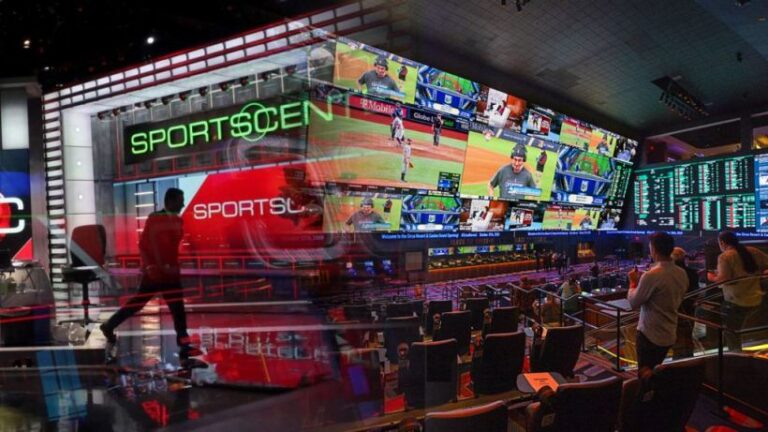Few industries have seen the explosion in growth like sports gambling has experienced over the past five years. What was once an underground operation conducted by some shady organizations is now front and center on some of the biggest sports TV networks.
How did we get here? It’s hard to pin down exactly one event that led to the gambling boom, but there’s no question that the huge demand from sports fans has been the driving force.
In this article, I’ll go over three reasons the sports gambling industry has a blindly-bright future.
1 – It’s Accessible
Some may disagree with my assessment, but I believe the number one reason sports gambling is growing so fast and reaching so many sports fans is due to the fact that everyone has a sportsbook— actually, multiple sportsbooks—right in their pocket.
The days of needing to find a local bookie or travel to a sportsbook to place a wager are gone. It’s easy to see why more people place bets on sports when it’s easier to do it.
Note:
Phones have become ubiquitous in way that nobody could have predicted back when bets were placed via a phone call from a pay phone to some organized crime organization’s backroom lair. No longer is there a barrier preventing you from putting in that play on the Jets +6 that you would have thought twice about if you had to jump through hoops to put your bet in.
Whether you use the top online sportsbooks to set your DFS roster (or in many states, place a typical sports bet on any game imaginable), your bookie is now always within arm’s reach. Sites like Bovada, MyBookie, and a seemingly-endless list of other up-and-coming sites aren’t just giving bettors the opportunity to place a wager at their convenience, they’re even giving bettors a range of choices to fit their specific preferences.

Imagine getting a notification on your phone letting you know that the NBA Finals game is getting ready to start in the next 30 minutes, accompanied by a message telling you to “Get your bets in!” before tip-off. How many sports fans, when prompted, can resist the excitement of having some skin in the game?! If the current state of the industry is any indication, the answer is not many.
Just as online shopping options such as Amazon, which removes most of the friction from the buying process, has increased the prevalence of ecommerce, so too has online sports betting (especially their apps) increased the likelihood of someone placing a bet on a game. When people have the action brought to them instead of the other way around, why wouldn’t they throw a few bucks on a game they’re already planning on watching?
2 – It’s Legal
Billions and billions of dollars were wagered on sports every year despite the legal standing of the industry. If this is surprising to you, I would invite you to do some research on other black market industries that prove once and for all that where there’s a demand, there are multiple organizations willing to provide the supply.
Note:
In 2021, sports betting isn’t just legal, it’s being advertised on TV, sports websites, billboards, and just about any other medium that gambling companies can find. Of course, the argument that with legalization comes better regulatory practices is reasonable, but there’s no length that ‘big betting’ won’t go to in order to drive new business.
Without question, there is a segment of the population who had avoided gambling on sports in the past because of its legal status (or lack thereof). Now, those sports fans no longer have to concern themselves with whether or not their money is going to be taken when their bookie ends up in the back of a cop car for the crime of accepting wagers on sporting events.

The most hardcore gamblers (and even those below them) haven’t been impacted by legalization all that much. They were making big bets prior to any type of legislation stating that it’s okay to risk your money on Sunday’s slate of NFL games. But the average Joe who simply didn’t know where to place a sports bet now has plenty of avenues at his disposal. And the data would suggest he’s taking advantage.
The bottom line is that the legalization means two things: no longer are legal consequences a concern to those who want to place a bet, and more importantly, the floodgates have been opened in terms of marketing.
When PASPA (Professional and Amateur Sports Betting Protection Act of 1992) was repealed in 2018, gambling businesses already had mechanism in place to launch a full-scale advertising blitz to grow their companies. It’s safe to say that their efforts were extremely effective.
3 – The Sports Industry Has Embraced It
First, I understand that to call “sports” one single industry might be a bit misleading. For example, the NBA is a much different organization than, say, NCAA football. But for the sake of this article, I’m putting them all together under one single umbrella.
This particular aspect of sports gambling was a concern for those opposed to legalization. They were of the belief that widespread, legalized gambling would lead to corruption and have a negative impact on the competitive integrity of the various leagues…especially in college.
Leagues like the NFL and NBA have leaned into gambling but there has been some hesitation on the college side. This isn’t unfounded either, as the NCAA has a long history of gambling scandals that have served as a cautionary tale as to how sports betting can negatively impact all the sports participating in NCAA competition.

Today, the conversation is shifting significantly as the NIL (name, image, likeness) laws have changed in regards to the benefits college athletes can receive. Big-name college athletes are no longer going to be looking for any way to make a few dollars, which means the concept of fixing games (which is harder to do in pro sports where the salaries make it not worth the risk for players) is eliminated.
Note:
Whether you’re someone who watches Fox Sports, ESPN, NBA TV, or any other sports media outlet, there’s a good chance you’ve seen a laundry list of sports betting segments, and even entire shows dedicated to gambling. For example, SVP’s Bad Beats has become overwhelmingly popular.
These shows aren’t just entertainment for those who are already betting—they’re an advertisement for sports fans who might be thinking about getting into it and just haven’t pulled the trigger yet. Make no mistake about it, the big betting companies have partnerships with just about all of the sports leagues and sports networks. These mutually-beneficial relationships help grow both the sports leagues and the gambling companies, and they’re only getting stronger as a result.
It makes sense why leagues weren’t always so friendly toward the sports betting community. As I stated earlier, there was a real threat of big-money crime organizations manipulating the results of games. It wasn’t just a fear either; it happened plenty of times that we know about and probably much more than that.
Receiving the approval of sports leagues has been invaluable to the sports betting industry. Getting access directly to sports fans has done wonders for expanding their brands. And if the past is an indication of the future, things are only going to get better.
Conclusion
It’s hard to speculate what the future looks like for the sports betting industry. As we see leagues continue to embrace the potential it has in growing fan bases, there’s a nearly endless supply of resources needed to scale sports gambling at a level nobody could have ever expected back when PASPA was law.
It’s too early to say whether or not pervasive sports gambling will have an impact on the sports and leagues themselves, but so far, it seems the two can coexist in harmony. Moving forward, it will be fascinating to see how this industry evolves as it reaches more and more fans across the US.











